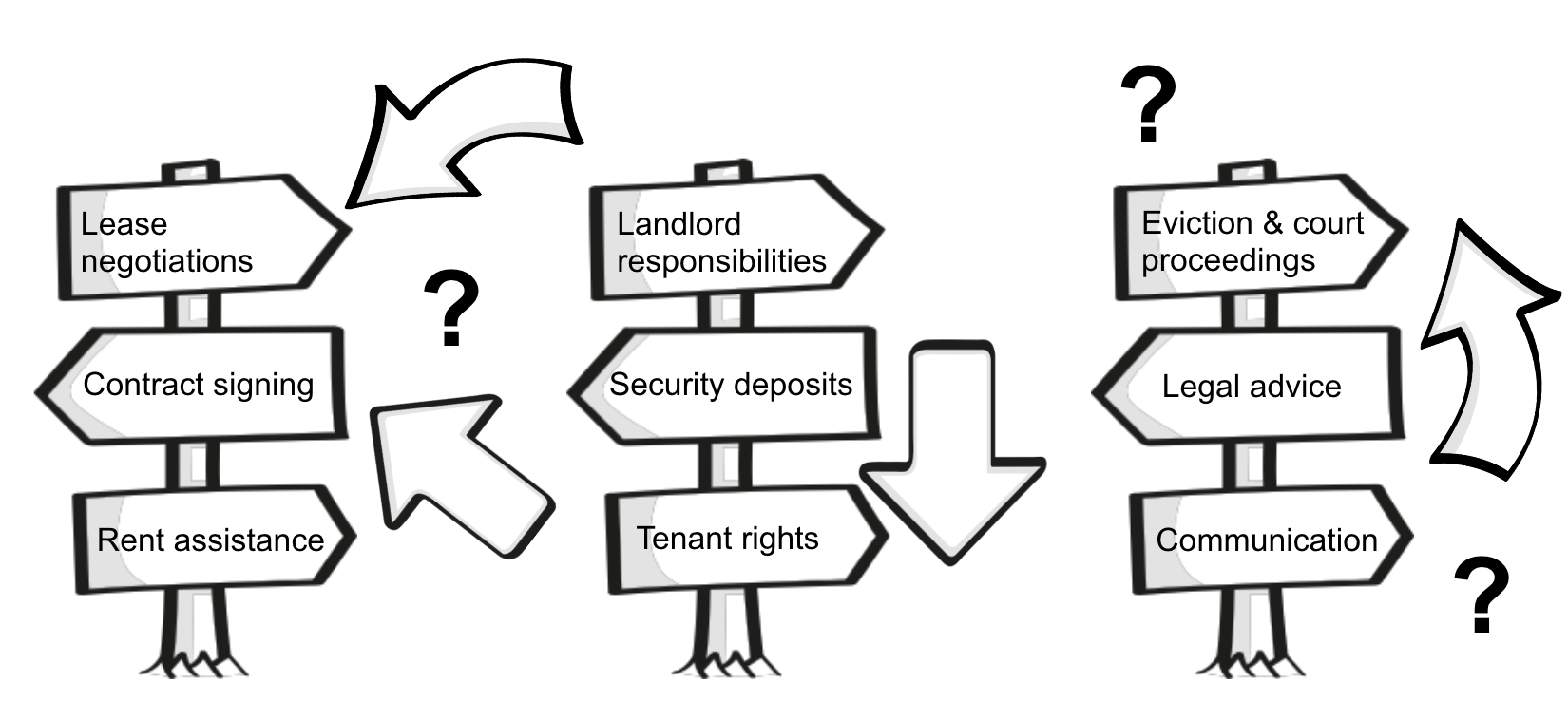Court Access for Eviction Litigants
i4J works with courts as they adopt new tech intended to improve court access for eviction litigants
-
The current civil legal system works well for property owners: 80% are represented by counsel and 75% prevail in their eviction proceedings. The majority of tenants do not appear in court. i4J works with courts and government offices as they adopt new systems intended to improve court access and resolution for eviction litigants. In 2021, members of i4J’s research team designed and tested landlord and tenant engagement strategies for a proposed eviction online dispute resolution platform in Story County, Iowa. In 2022, an i4J research team worked with Pima County’s Emergency Eviction Legal Services (EELS) to make recommendations about how best to encourage landlords to engage in eviction settlement conferences.
While these two projects were conducted in different jurisdictions, there are similarities and trends worth noting. Throughout both projects, landlord engagement proved challenging. The current system works well for landlords, and there is little incentive for them to participate in changing any of the related processes. In both projects, only around 10%-20% of landlords who were contacted agreed to participate in interviews or prototype testing. Participation increased when the landlords were approached about engagement opportunities by landlord organizations or court personnel with whom they have existing relationships.
Additionally, both projects resulted in recommendations for extensive and strategic landlord outreach. In both jurisdictions, landlords expressed a desire to problem-solve early, viewing eviction as a last resort. Many court and government systems are often situated downstream in the eviction process. Alternative dispute resolution opportunities offered close to or within the court process arrive too late for most landlords. Landlords expressed desire for opportunities for problem-solving through ODR and settlement conferences early in the landlord-tenant relationship, at the first sign of trouble. Outreach strategies from both projects recommended targeting landlord engagement early / before a formal eviction process is in motion, via trusted sources including other landlords and the court.
For more project-specific information, expand the EELS and eviction ODR sections below.
-
Tenants and landlords can benefit from resolving eviction cases through settlement conferences that avoid court judgments. Settlement conferences can keep tenants housed, allow them time to locate new housing, and help prevent the consequences of an eviction judgment. For landlords, settlement conferences can provide an opportunity to negotiate a payment plan with a tenant or agree on a move-out plan that saves the landlord the cost of litigating an eviction action. But few landlords were participating in settlement conferences with EELS at the start of this project.
In 2022, i4J partnered with EELS to provide research and recommendations for improving landlord engagement in eviction settlement conferences. The research team conducted a legal landscape analysis, interviewed stakeholders with touchpoints in the EELS system, designed a process map for EELS, and identified pain points and opportunity spaces within the EELS process to bolster future engagement strategies.
Full Report: Pima County Eviction Settlement Conference Engagement: Report and Recommendations
Project Brief: EELS Project Brief
-
In 2018, the Iowa Judicial Branch (IJB) engaged in strategic planning efforts intended to improve access in rural courts, develop a broader array of access to justice resources, and take advantage of digital opportunities. IJB identified online dispute resolution (ODR) capabilities as a potential component of this effort, and over the next year, a statewide ODR planning team met to design an ODR pilot project, select pilot project sites, investigate and select an ODR vendor, and engage stakeholders in program design and implementation plans.
The team selected Story County as a pilot site for an eviction ODR platform. In response to issues raised by external stakeholders, the team decided that the landlord/tenant ODR pilot project would be designed as a pre-filing program, which by definition makes it a voluntary, rather than a mandatory, program. If implemented, the Iowa ODR pilot would be the first pre-filing ODR platform for eviction cases in the nation.
i4J partnered with Story County to explore how we might engage landlords and tenants to ensure successful implementation of the pre-filing ODR.
Project Brief: Iowa ODR Project Brief


